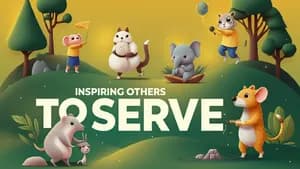Volunteering: A Journey of Self-Discovery and Service
Volunteering is more than just helping others; it's a journey of self-discovery. It's a chance to step outside your comfort zone, explore your passions, and contribute to something bigger than yourself. This journey can be transformative, leading to personal growth, new skills, and a deeper understanding of the world around you. In this article, we'll explore the profound impact volunteering can have on individuals, highlighting the skills gained, the broadened perspectives, and the sense of purpose it instills.
Unlocking Hidden Talents and Skills
Volunteering provides a unique opportunity to develop valuable skills that can be applied in various aspects of your life, including your academic pursuits. Imagine you volunteer at a local animal shelter. You might find yourself learning about animal care, handling, and even basic veterinary procedures. This hands-on experience can be immensely beneficial if you're considering a career in veterinary medicine. But even if you're not, the skills you acquire - problem-solving, communication, teamwork, and responsibility - are highly sought-after in any field.
Think about your interests and passions. Do you love working with children? Volunteering at a daycare or after-school program could help you develop your patience, creativity, and communication skills. Are you passionate about environmental issues? Volunteering for a local conservation organization could introduce you to the intricacies of ecology, sustainable practices, and the power of collective action. These experiences can provide valuable insights that can inform your academic choices, career decisions, and overall life direction.
Gaining New Perspectives and Building Empathy
Stepping outside your familiar world and interacting with people from different backgrounds and experiences can dramatically broaden your understanding and empathy. Volunteering exposes you to diverse perspectives and challenges, fostering a deeper understanding of the complexities of society. By engaging with individuals facing different situations, you develop empathy, which is a crucial skill for navigating a diverse and interconnected world.
For example, if you volunteer at a soup kitchen or homeless shelter, you'll gain firsthand experience with the realities of poverty and homelessness. You'll learn about the systemic factors contributing to these issues and the challenges individuals face in overcoming them. This experience will not only increase your empathy and understanding of social inequalities but also challenge you to think critically about solutions and advocate for positive change. This can be especially valuable if you're interested in fields like social work, public policy, or international development.
Finding Purpose and Making a Difference
In today's fast-paced and often overwhelming world, it's easy to feel disconnected and overwhelmed. Volunteering provides a sense of purpose and belonging by connecting you to something larger than yourself. By contributing your time and skills to a cause you care about, you can make a tangible difference in the lives of others, creating a ripple effect of positive change.
Whether you're helping to organize a community event, mentoring a younger student, or cleaning up a local park, your actions have a real impact. This sense of purpose can be incredibly rewarding and motivating, giving you a renewed sense of energy and enthusiasm for your own goals. Furthermore, volunteering can be a powerful tool for combating feelings of isolation and loneliness. By connecting with like-minded individuals and working towards a common goal, you can build lasting friendships and create a sense of community.
Learning Through Experience: Applying Volunteering to Your Studies
The skills and perspectives gained through volunteering can significantly enhance your learning experience. By applying your newly acquired skills to your studies, you can deepen your understanding of concepts and theories. Let's say you're studying history and volunteer at a local museum. You can use your volunteer experience to connect with historical artifacts and narratives in a more personal and engaging way. Your firsthand knowledge of museum operations and the stories behind the exhibits can enrich your understanding of historical events and their impact on society.
Similarly, if you're studying environmental science and volunteer for a conservation organization, you can apply your practical experience to your academic research, projects, and discussions. You can leverage your hands-on knowledge of ecological principles, conservation techniques, and community engagement to contribute insightful perspectives and unique insights to your academic work. Volunteering provides a unique opportunity to bridge the gap between theory and practice, making your learning more relevant, engaging, and meaningful.
Conclusion: A Journey of Growth and Connection
Volunteering is more than just a way to give back; it's an enriching journey of self-discovery and service. It's a chance to explore your passions, develop new skills, gain valuable perspectives, and find purpose in making a difference. By embracing the transformative power of volunteering, you can enhance your learning experience, cultivate your personal growth, and contribute to a more just and equitable world. So, take the leap, explore different volunteer opportunities, and embark on this enriching journey of self-discovery and service.

